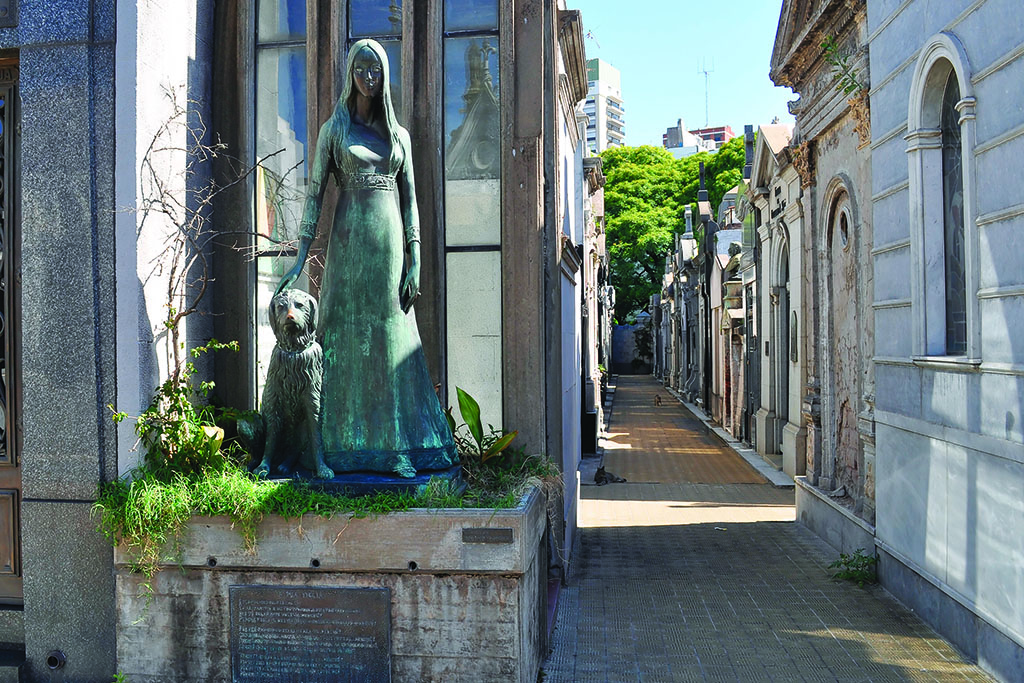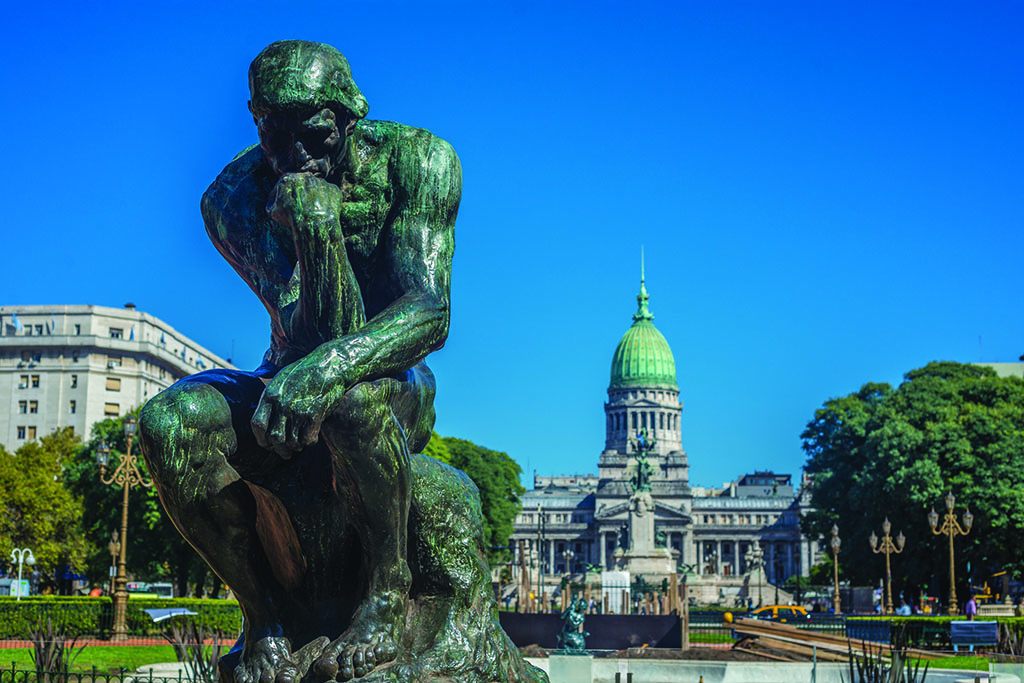If you love the spirit of San Telmo, a stay at the Be Hotel might be for you. Formerly the all-gay Axel Hotel, it’s still very gay-friendly. While the rooms are a little spartan, the staff more than makes up for it with their friendliness. Need to know of a nearby coffeehouse? A list of the best gay bars in town? A restaurant recommendation? Just ask, and the amiable young staff delivers.
In this bohemian neighborhood, it’s no surprise to find wonderful Café La Poesía, one of the leading gathering places for the intellectual/artsy set in the 1980s and 90s. It reopened in 2008 after a period of closure and is billed as a “Café de Arte/Bar Literario.” As I sit among shelves laden with wine bottles and books, I can just imagine the discussions that have gone on here, the poems written here. Have a sandwich or just a coffee (or a drink), and I guarantee you’ll love the friendly and intellectual feeling.
The restaurant scene in San Telmo is, like much in this district, a series of opposites (remember the well-dressed couple and the muttering lady?). La Brigada, for instance, is devoted to meat, with a concentration on that well-known Argentine specialty: beef. While you can get other dishes here, it’s the country’s famous product that’s the pride and joy, and carnivores will adore the place.
Origen, on the other hand, is an organic delight. With several sidewalk tables and a cozy little indoor dining room, it’s a great place for a bit of respite from the meat-heavy Argentine diet.
El Baqueano, across the street from La Poesia, offers a modern menu with flair, updating traditional dishes and creating new ones in a way that’s winning and ambitious. By contrast, Café San Juan has a traditional flavor, with amazing Italian food served in a homey atmosphere. The menu is on a chalkboard, the waiter is super-gracious, and the Italian food, from garlicky shrimp to black fettuccini with squid and smoked bacon, is amazing. (Note: there’s a “Cantina San Juan” a few blocks away, whose food isn’t as good and whose service is bizarrely hostile. Make sure you go to CAFÉ San Juan. Thanks.)
San Telmo is filled with pleasures like Cafe San Juan, the Mercado, and La Poesía, but what I love most is that it just refuses to be gentrified. However many nice restaurants or antique stores move in, there are still façades that are crumbling and graffiti adorning the walls. Sure, there are plenty of hip spots (and a Sunday flea market to die for), but there’s also an edge to the area. That’s rare these days.

La Boca
LA BOCA
The same feeling applies in La Boca, a former shipyard area at the mouth (la boca) of the Riachuelo River, just south of San Telmo. For tourists, the main attraction here is El Caminito (the little road), where houses of wood and corrugated metal are painted every color of the rainbow. On one side, an orange door opens to a balcony. On the other, an azure window frame sits in a scarlet façade. Along the entire length of this vibrant little street, artists display their wares, and it’s not the touristy crap you might expect, but really high-quality stuff: glass, jewelry, matches carved with tango dancers (I’m actually tempted by these). A silkscreen shows a pair of bicycles resting against the foot of a bridge. An abstract painting is alive with color and movement, somehow capturing the spirit of Buenos Aires without depicting a single city scene. It’s an open-air art gallery, where the prices are great, the work beautiful, and the surroundings one of a kind. Whether you make a quick detour here or spend the afternoon (which you could do) admiring or buying artwork, La Boca should be on your itinerary for the colorful display of art on El Caminito. Yes, it’s touristy as hell, but you are a tourist here, right?
RECOLETA
So far we’ve stayed mainly on the southern side of the downtown area. Let’s head north (and west) to Recoleta, a gracious district housing some of the city’s best hotels and shopping. The main landmark here is the Recoleta Cemetery. It’s one of the world’s great cemeteries, this above-ground burial place filled with monuments to the very wealthy. Eva Perón is buried here, in a simple mausoleum for her family, the Duartes. It’s far from the most impressive momument (that honor belongs to Mr. Ortiz Basuado and clan), and the long avenues are lined with mausoleums bigger than some New York apartments. You’ll find your favorites, I’m sure, at this must-see sight that might seem a little macabre but is actually one of the top sights in the city. It’s unthinkable to come to Buenos Aires and not see the Cementerio de Recoleta.

Recoleta Cemetery
I’m not at all surprised that such a posh cemetery is located in this upscale area of town. Walking around the streets, the words “Fifth Avenue” inevitably come to mind. At one end of Avenida Alvear is the gracious Alvear Palace, and if you’re into old, grand hotels, this is the spot for you. The lobby has marble floors, plush couches, and oriental rugs. The rooms are spacious and gorgeous, and such added attractions as a top-notch spa and afternoon tea in the stylish L’Orangerie, make this an urbane belle époque favorite. It anchors this end of Avenida Alvear as luxuriously as the Four Seasons does on the other end, with its leather/mahogany-accented or French country-style rooms, outdoor pool, cityscape views, and the customary Four Seasons service.
It’s not surprising that these two top-level hotels are both in Recoleta. Here, early 20th-century architecture mixes with modern echoes of it, and shops beckon with all the goods of fine living: antiques, high-end clothing, watches, jewelry, leather… etc.
While you’re here, make sure to visit the Fine Arts Museum where displays of classic Argentine art are on offer as well as the work of great painters from Monet to Modigliani.
Before leaving the area, I meet my friend Kenny in El Ateneo, an amazing bookstore in a former movie theater where we admire gilded mezzanines with brass railings, elaborate stucco carvings across rounded seating boxes, ornately decorated ceilings, and red curtains parted to reveal the stage, where the café is now located. It’s a stunningly repurposed structure, and while El Ateneo is a chain of bookstores, this is obviously their most beautiful branch. I love sitting in the café over coffee and a medialuna, or perhaps an empanada, gazing out at the splendor of the erstwhile theater. It’s beautiful, gracious, a bit touristic: like Recoleta itself.

